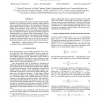Free Online Productivity Tools
i2Speak
i2Symbol
i2OCR
iTex2Img
iWeb2Print
iWeb2Shot
i2Type
iPdf2Split
iPdf2Merge
i2Bopomofo
i2Arabic
i2Style
i2Image
i2PDF
iLatex2Rtf
Sci2ools
161
click to vote
ICASSP
2011
IEEE
2011
IEEE
Stochastic behavior analysis of the Gaussian Kernel Least Mean Square algorithm
Like its linear counterpart, the Kernel Least Mean Square (KLMS) algorithm is also becoming popular in nonlinear adaptive filtering due to its simplicity and robustness. The “kernelization” of the linear adaptive filters modifies the statistics of the input signals, which now depends on the parameters of the used kernel. A Gaussian KLMS has two design parameters; the step size and the kernel bandwidth. Thus, new analytical models are required to predict the kernel-based algorithm behavior as a function of the design parameters. This paper studies the stochastic behavior of the Gaussian KLMS algorithm for white Gaussian input signals. The resulting model accurately predicts the algorithm behavior and can be used for choosing the algorithm parameters in order to achieve a prescribed performance.
Related Content
| Added | 20 Aug 2011 |
| Updated | 20 Aug 2011 |
| Type | Journal |
| Year | 2011 |
| Where | ICASSP |
| Authors | Wemerson D. Parreira, José Carlos M. Bermudez, Cédric Richard, Jean-Yves Tourneret |
Comments (0)

